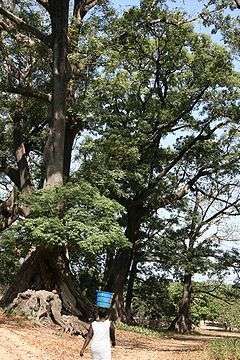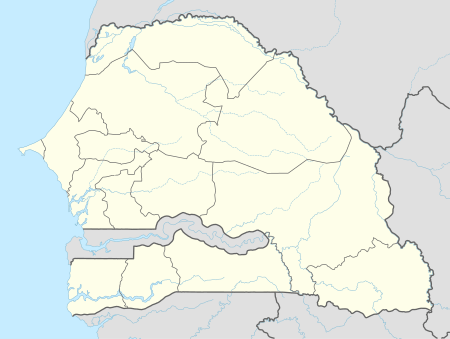Diembéring
Diembéring (also called Diembering, Diembéreng, Djiwat, Guimbering, Diébéring, Diebering, or Djembering) is a village in Senegal in the rural community of the same name. It is located in Cabrousse, Oussouye, Ziguinchor, Casamance, approximately 10 km north of Cap Skirring and 60 km from Ziguinchor.
Diembéring Diembering, Diembéreng, Djiwat, Guimbering, Diébéring, Diebering, Djembering | |
|---|---|
City | |
 Fromager (Kapok) tree near the village of Diembéring | |
 Diembéring Location in Senegal | |
| Coordinates: 12°28′8″N 16°46′50″W | |
| Country | |
| Region | Ziguinchor |
| Department | Oussouye |
| Arrondissement | Cabrousse |
History
Initially, Diembéring was a fishing village. It is still so today, however tourism has opened up other possibilities.
Administration
Diembéring is the capital of the rural district (communauté rurale) of the same name. Within the district are the other villages of :
- Boucotte Diola
- Boucotte Wolof
- Bouyouye
- Cachouane
- Cap Skirring
- Ehidje
- Gnikine
- Kabrousse
- Karabane
- Ourong
- Sifoca
- Wendaye
Geography
The nearest localities are Koudioundou, Nikine, Bouyouye, Cachouane, Boucotte Wolof, and Mossor.
Physical geography
Diembéring was built on sand dunes, among palm trees and large Kapok trees (known locally as Fromager trees)
Population
Diembéring is one of the few places where people speak Kuwaataay, a dialect of Jola.
Economy
The beaches of this coastal village are popular with tourists. There is a mosque in the area, as well as a church where a Jola mass is sung each Sunday. A maternity hospital is run by Spanish nuns.
See also
Bibliography
- Stephen Payne (1992). "Une grammaire pratique avec phonologie et dictionnaire de kwatay (parler du village de Diémbéring, Basse Casamance, Sénégal)". Cahiers de Recherche Linguistique (in French). Dakar: Société internationale de linguistique (SIL): 134.
- Louis-Vincent Thomas (October 1967). "Veillée Djiwat". Notes africaines (in French) (116): 105–109.
External links
| Wikimedia Commons has media related to Diembéring. |